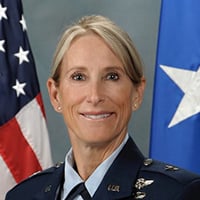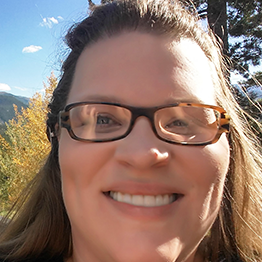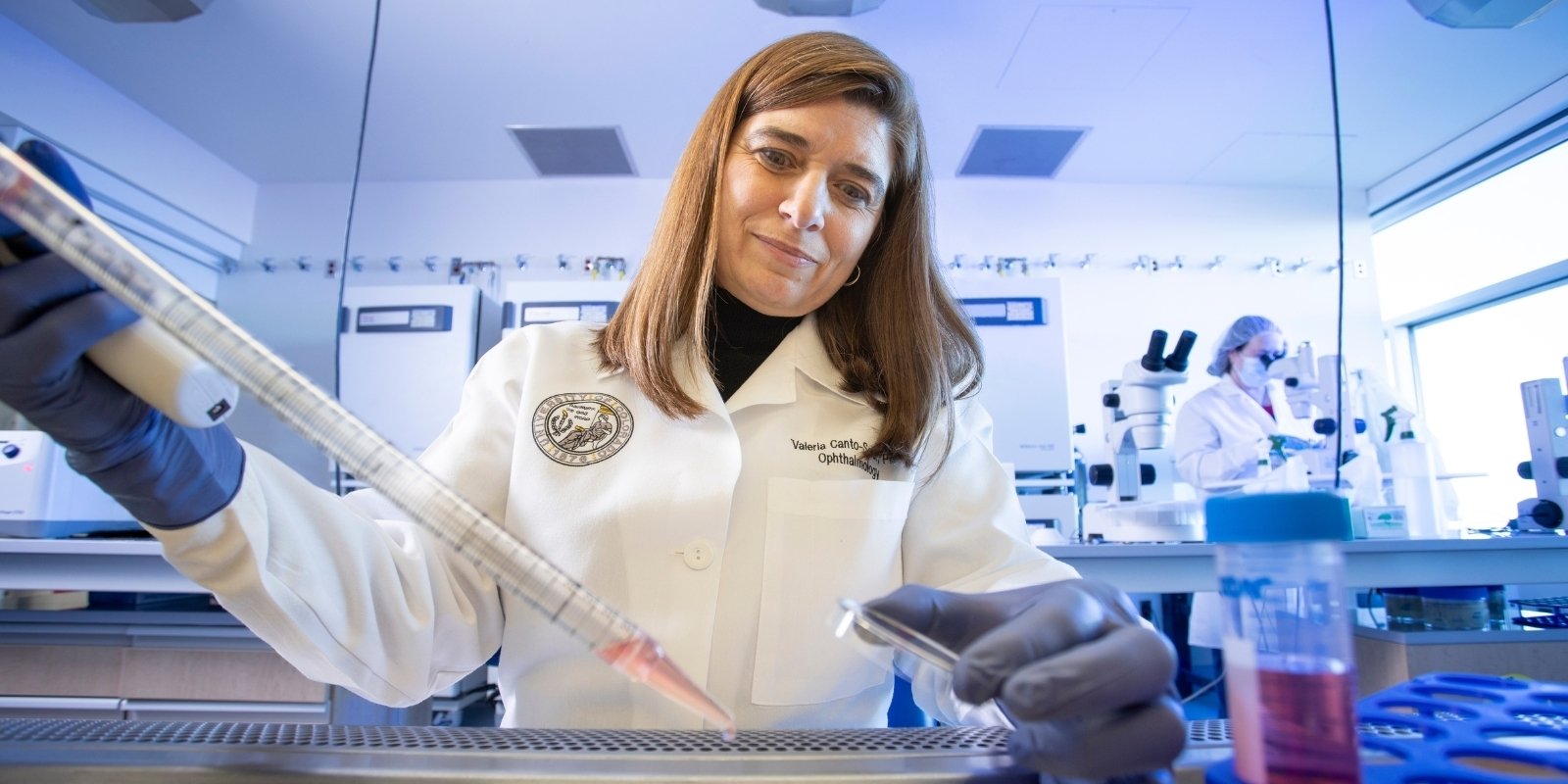Celebrating exceptional women on the University of Colorado Anschutz Medical Campus? No problem.
The women on this campus teach tomorrow’s healthcare experts, move science forward with breakthrough discoveries and care for patients during their most challenging times. They are medical pioneers, wives, daughters, sisters, friends, mothers, role models and heroes.
Throughout the month of September, in recognition of the American Medical Association’s (AMA) Women in Medicine Month, we are recognizing a few of the extraordinary women who work in all aspects of the medical field on this campus. They will share the significance of being a woman in medicine and the challenges of fulfilling their numerous roles during a worldwide pandemic.
Making her voice heard: CU’s Kathleen Flarity rises high in U.S. Air Force
Kathleen Flarity is a brigadier general in the U.S. Air Force (one of the highest positions a nurse can hold in the Air Force) and an associate clinical professor at the University of Colorado School of Medicine and the College of Nursing. She is also a UCHealth research nurse scientist and deputy director of the CU Anschutz Center for COMBAT Research in the Department of Emergency Medicine.
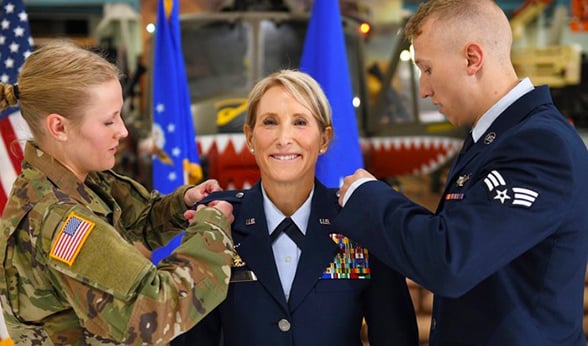
Cadet Tori Flarity and Senior Airman Patrick Flarity pin stars on their newly promoted mother, Brig. Gen. Kathleen Flarity, during a ceremony at Wings Over the Rockies Air and Space Museum in Denver. (Photo courtesy of Buckley PA) |
What does being a ‘Woman in Medicine’ mean to you?
I have been a woman in medicine since joining the Army as a combat medic in 1980. I have had to prove myself again and again with each new position, earning respect of my peers. But, instead of being resentful with that, I saw it as an opportunity to make an impact, to make a difference. I didn’t just want inclusion, to just be invited. I wanted integration, to have a “heard” voice and be part of the team.
Our teams are stronger when we hire, retain and cultivate talented women and underserved groups and empower them to have a voice. I now have a “heard” voice. Often back then, I was viewed as less capable. As Gen. Jacqueline Van Ovost (my military boss) said, “I wanted to make the path for women wider, not necessarily easier, but wider, with greater opportunity and fewer barriers.”
How has the COVID-19 pandemic affected you personally?
In multiple ways. Professionally, from serving on COVID Task Forces, caring for COVID patients, caring for the caregiver and, in my military role, deploying medics in support of COVID. Personally, as an extroverted world traveler, it has been challenging. I miss being with people, family, friends, colleagues!
In my resiliency research, we know that social connectedness is important to our personal well-being. Without the human connection – our primary means of support and mitigating the many challenges of the pandemic – we are less equipped, and more negatively affected
How has it affected your career in medicine?
Initially, I was data driven: What is the latest study, report or science? Later, COVID expanded my experience by working in clinical areas I had not worked before. Lastly, by the blessings and the burdens from the pandemic. We have seen a lot of people really rise to the challenge and do extraordinary things. But we have also experienced loss and stress during the pandemic, individually and collectively.
Teaching for the future: Pharmacy’s Meghan Jeffres challenges students, status quo
Meghan Jeffres is an associate professor in the Department of Clinical Pharmacy at the Skaggs School of Pharmacy and Pharmaceutical Sciences. The recipient of the 2021 President's Excellence in Teaching award, Jeffres is a standout teacher who employs innovation and imagination in the classroom. She has won an Excellence in Innovation award from the National Alliance of State Pharmacy Association and an Innovations in Teaching award from the American Association of Colleges of Pharmacy. She is also an elected board member of the Society of Infectious Diseases Pharmacists.
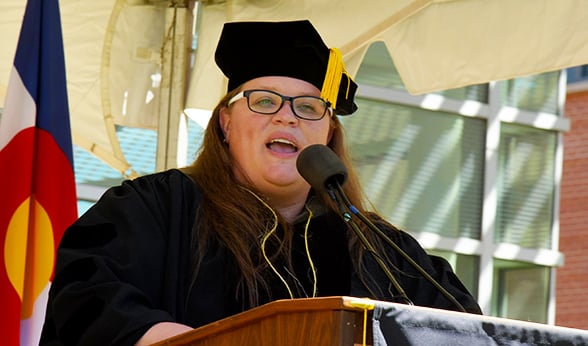 As a recipient of the 2021 President's Excellence in Teaching award, Jeffres was a featured speaker at this spring's graduation ceremonies. As a recipient of the 2021 President's Excellence in Teaching award, Jeffres was a featured speaker at this spring's graduation ceremonies. |
What does being a ‘Woman in Medicine’ mean to you?
Being a woman in medicine means being a living example for learners – demonstrating that challenging the status quo and advocating for change is possible and worthy of our time and effort. Being a woman in medicine means advocating for female patients and educating providers and learners about the gender bias in healthcare.
How has the COVID-19 pandemic affected you personally?
The COVID-19 pandemic has affected me personally in several ways. Prior to getting vaccinated, isolation was difficult. I think most healthcare providers were terrified of being vectors, which meant not seeing friends and family for a year. I needed something to look forward to outside of the hospital, so I took up rockhounding and jewelry making. Learning a new skill set that didn’t involve dissecting Emergency Use Authorizations (EUAs) every Friday afternoon was incredibly helpful for my mental health.
How has it affected your career in medicine?
The feelings of burnout during the COVID-19 pandemic are real. The workload for myself and colleagues has been enormous for two years. Many colleagues have left for alternative careers, which is exciting for them, but increases the workload for those who remain. It has also been challenging to maintain compassion for the part of the public that refuses to get vaccinated, further exacerbating workload. It’s a gut check for us.

